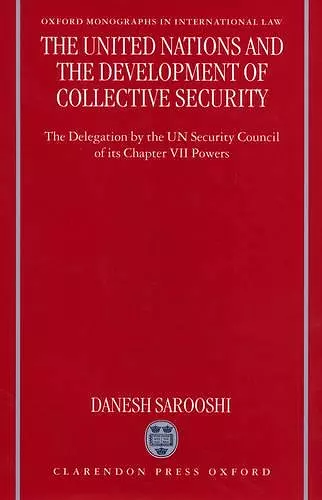The United Nations and the Development of Collective Security
The Delegation by the UN Security Council of its Chapter VII Powers
Format:Paperback
Publisher:Oxford University Press
Currently unavailable, and unfortunately no date known when it will be back
This paperback is available in another edition too:
- Hardback£237.50(9780198268635)

Winner of the 1999 Paul Guggenheim Prize and the 2001 Certificate of Merit of the American Society of International Law
This book provides a legal analysis of the institutional mechanisms and processes which the UN employs to use force to maintain or restore peace.This book examines one of the most important challenges facing the United Nations today: the effective and lawful use of force by or under the authority of the UN to maintain or restore peace. In particular, the book provides a legal analysis of the institutional mechanisms and processes which the UN employs to use force to maintain or restore peace. The UN Security Council is the main organ of the UN entrusted with the responsibility for the maintenance or restoration of peace. It is given broad powers of enforcement under Chapter VII of the UN Charter in order to achieve this objective. However, the Charter provision which was intended to provide the Council with a standing military force to carry out enforcement action has not as yet been implemented. In response, the Council has sought to deal with an increasing demand for military enforcement action by delegating its powers in this area to other UN organs (e.g. the UN Secretary-General in Somalia, and the War Crimes Tribunals for Rwanda and the former Yugoslavia), UN Member States (e.g. the coalition against Iraq), and regional and collective self-defence organizations (e.g. NATO in Bosnia). It is this process of delegation of military enforcement powers by the Council which is the focus of the book. By examining the legal framework which governs the process of a delegation by the Council of its Chapter VII powers; the practice relating to the exercise of these powers by each of the delegates concerned; and the policy issues relating to such delegations, the book makes a significant contribution to the content of the law pertaining to the use of force by the UN and provides guidance as to the likely future developments in the legal framework governing collective action to maintain peace under the auspices of the United Nations.
The strength of the study lies in the thoroughness of analysis demonstrated throughout the work.....an impressively constructed piece of scholarly research.....a practitioner's guide for both academics and diplomats on the subject of Chapter VII delegationsof power. With sweeping efficiency, Sarooshi makes sense out of a previously nebulous corpus of Security Council practice, in the process creating a comprehensive benchmark for the comparison of all future Chapter VII delegations. * Alexander Borisoff, Jnl. Intl. Law & Politics Vol. 32:1175 (2000) *
this book is a valuable contribution to the literature on the UN collective security system * Journal of Conflict and curity Law, Volume six, number one *
contains a thorough and meticulous analysis of the legal implications of the doctrine of delegation when applied in the field of collective security * Journal of Conflict and Security Law, Volume 6, Number 1 *
The attraction to the author's method is its simplicity, and it is a simplicity that belies an ability to resolve even the most complex issues. Once the theoretical structure is erected, Sarooshi can turn to analyze actual situations armed with an analytical tool of the first rate. Sarooshi's trenchant work, besides providing an invaluable analytical tool, is a remarkable compilation of UN practice and an immensely helpful legal resource. * Harvard International Law Journal, 2000 *
the examination is impressive. there can be no doubt that this study constitutes an invaluable addition to the body of knowledge in this constantly evolving area. * The British Year Book of International Law, 1999 *
impressive study The book stands out from others for its imaginativeness and thoughtfulness, and the mastery of a vast and complex practice of the Security Council over more than 50 years. Danesh Sarooshi develops indeed no less than a 'theory of legitimate delegation. * European Journal of International Law, 2000 *
Dr Sarooshi has provided an elaborate analytical tool to examine Security Council practice and applied it sharply and perceptively. it is an exercise well-worth attempting and carried out in a most accomplished way. * International and Comparative Law Quarterly, 1999 *
a comprehensive and well-conceived book...This excellent insight into a somewhat murky arenea provides quick access to the vital content, while at the same time providing an authoritative treatment of this complex subject. * American Society of International Law Newsletter *
Comprehensive analysis of the UN Security Council's powers, practical in approach. * Dr A. Kaczorowska, Principal Lecturer, Southampton Institute *
An excellent exploration of the Chapter VII power of the Security Council. * Mr R. Wood, Anglia Polytechnic University *
Very welcome update on collective security issues. * Charlotte Brelkerton, Liverpool John Moores University *
The high degree of conceptual clarity in a work that deals with the most complex aspects of the maintainance of international peace and security is the key to the book's success. * P.A. Eden, University of Sussex *
- Winner of Winner of the 1999 Paul Guggenheim Prize & the 2001 Certificate of Merit of the American Society of International Law.
ISBN: 9780198299349
Dimensions: 234mm x 157mm x 19mm
Weight: 483g
334 pages